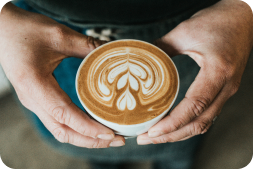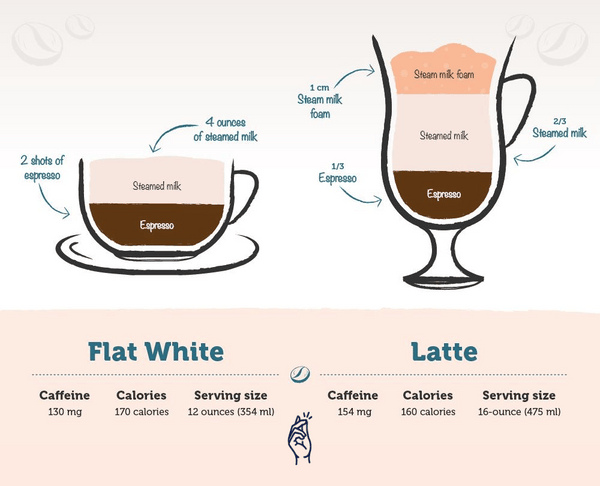Should Coffee Be Bitter?
At Presto Coffee, we believe coffee is not supposed to be bitter. In fact, bitterness is an ugly word in the coffee industry. Coffee should rather be strong than bitter, do not mistake the two. The coffee can be strong but not bitter. There are several reasons why coffee tastes bitter, the reasons are explained below.
Why Coffee Tastes Bitter: The Technicalities
1. You’re letting your coffee steep for too long.
The grounds should not be stepped for too long. In the case that you are making use of a French press, the coffee grounds must not be submerged in water for more than four minutes. Not serving the coffee immediately after it's done stepping will cause it to become bitter.
2. You’re using the wrong grind size.
A common cause of bitter coffee is grinding the coffee to a too fine size. If you do not know the right grind size according to how you make coffee, you will definitely get bitter coffee.
3. The water is too hot.
If the water is too hot, you will definitely get coffee that is better hence it would be wise to boil it at a suitable temperature to avoid bitterness.
4. Your equipment is dirty
There might be residues in your equipment that might lead to the coffee being made to be bitter hence always make sure your equipment is clean if you do not want bitter coffee.
How do you make coffee not bitter?
Grind your beans more coarsely
Grinding coarsely your beans will lead to less extraction. When water comes in contact with the coffee ground, it does not reach the centre of that ground coffee in an easy way, it has to make some effort. So if the coffee grounds are large it only means there is a lot of work for the water to do which will lead to a slow breakdown of your coffee. So in the case that your coffee is tasting too bitter, the solution would be to provide coarser, larger grind particles. If the brewing is done for the same amount of time, less extraction will be obtained which will mean less bitterness.
Cut down the brewing time
If it is not in your plans to change the grind size, an alternative way would be brewing for less time. In the case you own a French press or an Aeropress for instance, these are methods that give you a chance to control the brewing time hence just reduce your brewing time by 15 seconds. You will notice that it will lower down the bitterness and increase the sweetness.
Brew Weaker Coffee
Another alternative way of making your coffee less bitter is to brew weaker coffee. This is rather an easy way that just requires you to use less coffee than the usual amount. In addition to changing the grind size or brew time, which affects the balance of flavours more than the total flavour intensity, the opposite will be obtained from changing the brew ratio. This works in reducing the acidity, sweetness, and bitterness as well.
Lighten Up
The level of roast has to be considered if your coffee is too bitter. Caramelization and the Maillard reaction are the two processes that turn the colour of coffee brown and complex flavours are created in the process which eventually lead to bitter flavours. This does not necessarily a well-brewed dark roast has to be overly bitter, if you are not a fan of that option, feel free to choose a lighter roast which is a safer option.
Can stale coffee beans cause coffee to taste bitter?
Yes, stake Whole Bean Coffee can cause coffee to taste bitter. This is because whole bean coffee is at peak freshness in the first three weeks after it is roasted. When the three weeks are done, the oils and beans which are found inside the coffee bean escape which causes the coffee to have a bitter taste. In the case that you are making use of pre-ground coffee, the coffee will become bitter in a period of 24 hours after it is ground. This is why it is highly recommended to buy freshly roasted whole bean coffee and make sure to always grind it well before it can be brewed.
What is the most bitter coffee?
Darkly roasted coffee is the most bitter coffee. This is because there is the breakdown of chlorogenic acid lactones into phenylindanes which occurs during the process of roasting. Phenylindanes are responsible for the production of flavours that are harsh and bitter in taste. After being roasted, different varieties of beans have different levels of bitterness due to a difference in the levels of phenylindanes. The robusta variety has a higher level of phenylindanes than arabica which implies that it is more bitter.
How can I make my coffee stronger but not bitter?
A teaspoon adding sugar to black coffee
This is considered the main way of having coffee that is not bitter. Make sure you buy coffee of good quality from a local roaster or online. This does not entirely guarantee sweet coffee as errors done by the user can make the coffee bitter.
In the case that your coffee has been over-extracted and it ends up becoming bitter, see to it that you find out the cause by making changes in the brewing parameter at a time. You will not be able to identify the cause of your change multiple parameters at once.
If you find yourself in a situation where you have bought very bad coffee, know that the only way of getting rid of the bitter taste is to make an addition of a lot of sweetener or sugar. The bitterness can further be reduced by making an addition of milk as well.
Making a cold brew
An alternative way is to make a cold brew. Water is required to be hot if you are extracting the bitter compounds which are found in the coffee by nature. If you use cold water in brewing ground coffee, what you will obtain is coffee that is less bitter and much sweeter.
How to make a cold brew
- One part of medium-ground coffee has to be combined with eight parts of water.
- Then the mixture has to be left for a period of about 12 to 24 hours.
- A metal filter has to be used in the filtration process. It can also be filtered using a cloth or using a paper filter.
Clean your equipment
You must see that your coffee equipment is made clean by the use of detergent after every time you use it. Make sure you rinse it thoroughly although this does not entirely get rid of the coffee oils which tend to build up after some time.
Is Bitter coffee bad for you?
Bitter coffee is not bad for your health. This is evidenced by the following evidence that comes from having bitter coffee.
Bitter coffee sharpens the memory
This bitter coffee will prove to be effective to you in your learning process. A study was conducted in the year 2005 by the Radiological Society of North America and it was found that after a person consumes 2 cups of caffeinated coffee, there is an improvement in the memory and a person's reaction is increased in speed.
Two years later, a research that was conducted in 2007 found that if women aged 65 years and over that age consumed three cups of bitter coffee during the day, the memory became much better and a deterioration in memory was not shown in comparison to those who drank only one cup of coffee per day.
Bitter coffee lowers the risk of getting cancer
When it comes to health benefits, this is the one you have to know. Taking bitter coffee is said to have a positive impact on health as it reduces the risk of getting liver cancer, breast cancer, prostate cancer, and even obesity, insulin, or estrogen. This is backed up by the research that was done on Sweden in 2008.
It helps in preventing depression
Depression is a common problem among most adults. Research that has come into publishing from the archives of internal medicine in 2011 has been revealed that if women take 2 to 3 cups of bitter coffee each and every day, the risk of developing depression will be reduced by 15%.
How much salt does it take to make coffee less bitter?
It is recommended that when you are brewing coffee, you must use two tablespoons of ground coffee and a quarter teaspoon of kosher salt per cup of water. The amount of salt added is directly proportional to the reduced amount of bitterness although it increases the saltiness. The saltiness must be avoided at all costs hence the need to add a few grains per cup to remove the bitter taste.
How Salt Makes Coffee Less Bitter
Know that there are five basic tastes of food and these are sweet, salty, bitter, sour, and savoury. Salt plays a role in the taste of food by making an increment in the sensitivity of certain taste receptors and at the same time decreasing the sensitivity of others. During low concentrations, the sodium ion found in the salt works in suppressing the transduction mechanism which sends signals to the brain for bitter and sour flavours. Sweetness is also enhanced by the salt at this very same time. In the end, salt leads to fruity, complex flavours. This is the reason salt does very well with a margarita. This very same effect is applied to coffee.
A lot of people have an assumption that caffeine is the culprit to coffee bitterness but if you ask a decaf drinker, they will tell you there is more to that. Roasting coffee leads to bitter-tasting chlorogenic acid, lactones, and phenylindanes. Darker roasts contain more phenylindanes which implies a more bitter taste. If you also leave the brewed coffee on the heat for too long, it will make it bitter. Salt comes in to reduce the bitterness of both decaffeinated and regular coffee.
What takes the bitterness out of coffee?
In this section, how we are going to do it is to look at some of the causes of bitterness in coffee and how to take the bitterness out of it.
The clock's ticking
A lot of people tend to overcook their coffee and this is one of the main reasons a bitter brew of coffee is obtained. This is the same case as that of tea, which gets its flavour from steeping in hot water. The result of steeping for too long is that the bitter taste will takeover and your coffee will end up tasting burnt.
How to take the bitterness out
- Have in mind the required time for your coffee to be brewed
- A timer has to be set that should tell you when it is time to enjoy your coffee
- In (too) hot water
A lot of people allow their water to boil and then brew their coffee. Temperatures such as 212 degrees Fahrenheit are actually too hot for brewing your coffee which tends to get your coffee overcooked.
How to take the bitterness out
Patience is a virtue but if you want your coffee quickly, you can choose to buy a kettle that has temperature control which will allow you to choose the right temperature preferably 195 degrees Fahrenheit to 205 degrees Fahrenheit which eliminates guesswork and the need for you to be patient.
If you are doing this using the old ways, you will need to wait for an appointment for 30 to 45 seconds to bring the temperature down to the magic coffee brewing range. Just keep in mind that hotter water leads to bitter coffee while colder water leads to weak coffee.
Quantity over quality
The bottom line is that not all coffee has the same quality. Cheap coffee has many problems like being over-roasted to cover up the imperfections which come as a result of low-altitude growing and even mass harvesting. In the case that your coffee is over-roasted, it will have a bitter and burnt taste which is very undesirable. After the beans have been burnt, the process can not be reversed.
How to take the bitterness out
Stay classy and purchase better beans. It might expensive to buy better coffee but after tasting it you will thank yourself for buying such great coffee and you will clearly differentiate the tastes between the beans, the low low-quality, and the high-quality ones.
Too much of a good thing
Do not lose your way with the good stuff. Make sure you do not add too much coffee. The amount of coffee you add must be in line with the amount of water that you must use. Adding coffee relative to the amount of water will lead to a coffee that is bitter and too strong.
How to take the bitterness out
Make sure you apply the coffee according to the specifications. If you use automatic drip machines, add 1 to 1.5 tablespoons of ground coffee for every 6oz of water that is used. In the case of other brew methods like the french press, you can apply 1.5 to 2 tablespoons. You can use a scale of you are doing this in a scientific way.
That daily grind
The problem of grinding your coffee too finely is that you over-extract and exposed the coffee in the process and this can be compared to overcooking which eventually leads to a bitter brew of coffee which is so undesirable.
How to take the bitterness out
You must see to it that the coffee is not ground too finely for any brew method that you plan on using and you can find out the suitable ground size according to the brewing method that you are using.
A clean slate
The leftovers from your last brew can accumulate at a very fast pace and what results is not pretty as you expect. The residues from your old coffee will add some bitterness which will lead to your fresh brew tasting bitter and stale.
How to take the bitterness out
Always make sure that you clean your coffee maker every time using it because it is much easier to clean it after immediately using it than waiting a long time to use it later.
Do light Roast Coffee beans produce less bitter coffee?
The answer to this is that light roast coffee produces less bitter coffee than dark roast coffee. Light roast and dark roast coffee tend to have different tastes. Even a light roast batch will tend to give you a different taste than a light roast batch which is prepared by another roastery. Light roasts will give more distinct flavours, while dark roasts will have less, but more robust, flavours. You may discover more in the differences between light and dark roast if you don't comparison between the beverages such as mochaccinos, flat whites, and, even Irish coffee.




